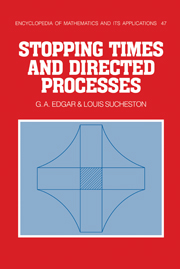2 - Infinite measure and Orlicz spaces
Published online by Cambridge University Press: 21 January 2010
Summary
In this chapter we will prepare some of the tools to be used later.
One important possibility is the use of an infinite measure space, rather than a probability space. For probability in the narrow sense, only finite measure spaces are normally used. Attempts to do probability in infinite measure spaces have had little success. In most of the book, we consider primarily the case of finite measure space. But there are reasons for considering infinite measure spaces. The techniques to be developed for pointwise convergence theorems can tell us something also in infinite measure spaces. The ergodic theorems in Chapter 8 often have their natural setting in infinite measure spaces. J. A. Hartigan [1983] argues that an infinite measure space provides a rigorous foundation for Bayesian statistics. Our material on derivation requires the possibility of infinite measures to cover the most common cases, such as Euclidean space IRn with Lebesgue measure.
Another important tool to be used is the Orlicz space. The class of Orlicz spaces generalizes the class of function spaces Lp. If the primary concern is finite measure space, then Orlicz spaces are basic. A necessary and sufficient condition for uniform integrability of a set of functions is boundedness in an Orlicz norm. Zygmund's Orlicz space L log L, and, more generally, Orlicz spaces L logkL, appear naturally in considerations of integrability of supremum and related multiparameter convergence theorems. For consideration of infinite measure spaces, Orlicz spaces will not suffice, unless property (Δ2) holds.
Information
- Type
- Chapter
- Information
- Stopping Times and Directed Processes , pp. 33 - 81Publisher: Cambridge University PressPrint publication year: 1992
